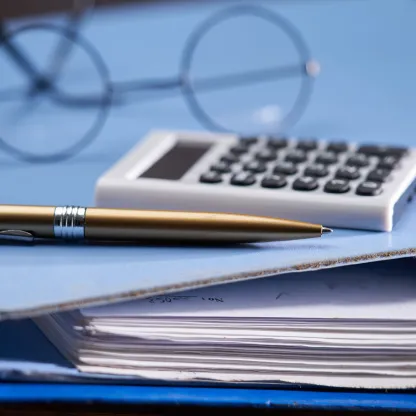Reset your finances, set goals and take control of your plans.

Don't be a financial procrastinator
Article last updated 3 March 2025.
Many of us enter the new year with a bundle of resolutions and heroic hopes of self-improvement. But often April comes around quickly: plans to read the classics have melted in the face of more-welcoming fare, while hopes of improving your finances are again limited to simply taking out an ISA before the tax year ends.
The start of a new year is actually a great time to review your finances, set your objectives and work out what you can do to create a more secure financial future. It’s a definitive milestone that you can use every year to reassess your goals, track progress and make necessary changes. It also leaves you plenty of time ahead of the tax-year deadline of 5 April to make the best use of your allowances. The hard part is also the easy part: you just need to commit to sitting down for an hour or two.
To help avoid continually putting it off, agree a date with your partner. Or if it’s just you, put it in the calendar as a meeting with yourself. You’ll be surprised how much more concrete the plan becomes when you’ve written it down.
Now that you’re sat down, you want to think about the year just been, the year ahead and your longer-term goals. Here’s a list of things to go through:
Money in, money out
The best place to start is setting a budget. As with anything, you need a reference point. Review last year to see how much money you received and how much you spent. Then use that to plan the year ahead. Consider:
— How much money did you expect to earn versus how much did you actually receive?
— What were your expenses and were they more or less than you had budgeted for?
— How much money are you expecting to receive in the coming year, and are there any ways to increase it? For example, through tax planning or taking on extra work.
— How much are you expecting to spend on bills, and are there any ways to reduce them, either through better budgeting or shopping around for better deals?
— When are you expecting your bills to arrive and when are you expecting to receive your income each month? This will help to determine your short-term savings and decisions about paying down any debts you may have.
What do I want to achieve in the long-term?
— Do you need to save for the children’s education, a deposit for a new home, or something fun like a holiday? If so, how much will you need and when?
— When do you want to retire, and how much money will you need to live comfortably?
Don’t forget that, because of inflation, you will need to save more than what it would cost today.
— What pension savings do you have, are they performing as you would expect, and are you on track to meeting your retirement needs? If not can you increase your pension contributions?
Payments into your workplace pension pot are generally made before your income is taxed, by upping contributions you may be able to reduce your tax.
It’s important to make the right decisions and our financial planners can guide you through the complexity to help you avoid any mistakes that could be expensive later. Here are some of the main issues to consider:
Investing wisely
Once you’ve taken the time to think about the current state of your finances and worked out where there’s room for improvement, it’s time to put it into action. If you stick to your budget, you know you will have enough to pay your bills when they arrive, and you know how much you will be saving every month.
It’s important to keep enough money in cash to protect you from unexpected costs or to tide you over in case of emergency, for example, losing your job. But holding too much in cash can also be just as detrimental, which is why one of the Financial Conduct Authority’s goals is to reduce the number of Brits who are holding more than 75% of their investable assets in cash*. Everyone’s situation is different, but generally keeping at least six months’ expenses in cash is recommended. A good portion of the rest can be invested, as long as you diversify properly and don’t need it for five years or more, giving your money the opportunity to grow for tomorrow. Albeit, investing does come with risk and there’s a chance that you’ll get back less than you invested.
— Although cash savings rates are relatively attractive at the moment, have you considered the impact of inflation and taxes on returns, and could you move some of the money into investments?
— We would always advise speaking to a professional who will be able to help you make the best decisions based on your circumstances. Speak to your Rathbones contact or get in touch with us if you think we can help.
What could go wrong?
Life is full of surprises but it’s how you deal with them that counts. We mentioned having a cash buffer for life’s surprises, but there are other things you can do to make sure money is one of the things you and your family don’t have to worry about if the worst happens.
— Have you reviewed your existing policies, such as life insurance or income protection, and do you need to make any changes to reflect your situation today?
— Is it worthwhile setting up a lasting power of attorney, to ensure that someone can make financial decisions on your behalf if an unfortunate future accident or illness leaves you incapacitated?
— Have you made a will or reviewed it recently to check that the information is up to date, that it details your assets and reflects your situation and wishes?
|
Did you know? — You can’t carry over your allowances for adult or Junior Individual Savings Accounts (ISAs and JISAs) to the next tax year. Make sure you’ve used as much of your £20,000 allowance or £9,000 for under 18s as you can before 5 April 2025. — Following recent changes, you can now contribute up to £60,000 each year to your pension, meaning there’s an even greater opportunity to boost your retirement savings if you can afford to. You may also be able to carry forward any unused annual allowances for pension contributions from the past three years. — Every year you have a £3,000 gifting allowance and the money will be immediately outside your estate for IHT purposes. You can carry this allowance over if you didn’t use it in the previous tax year, giving you a £6,000 allowance this year. — As well as contributing to your own pension, you can pay into pensions for your partner, children and grandchildren. This can be a tax-efficient way not only to save for your family’s future but also to move money outside your estate for inheritance tax (IHT) purposes subject to the usual gifting rules. Typically, IHT will not apply to a monetary gift made seven years or more before the donor dies, or for regular payments, if they don’t reduce the donor’s standard of living. — Allowances for capital gains and dividend tax are currently £3,000 and £500. You will lose these allowances if you don’t use them by the end of the tax year. |
Next steps
Managing your money and setting your goals after the most expensive time of the year can feel daunting, but it’s better to start sooner than later. Connecting with our financial planners to review your goals can give you a clear idea of how your finances are shaping up.
We’re here to help you design and implement a plan that makes the most of your money now and in the future. If you’d like to know more, please speak to your Rathbones contact or get in touch with us.
*www.fca.org.uk




